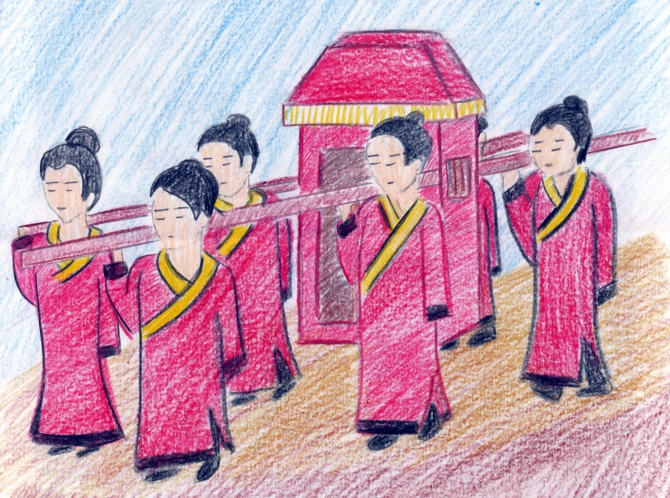
“Although they knew the chair only contained paper material, it was nevertheless heavy, just as though real, living people were inside.”
(Drawing by Daniella Gochuico, Eleanor Roosevelt College, UCSD, Class of 2019, by permission.)
Three Weary Travellers
A Grieving Widower
His Late Wife (or a part of her)
Long ago there lived an old woman whose young daughter had died many years before. One night the daughter appeared in a dream and said to her mother, "Mother, I am very lonely here. I must have a companion who will love and care for me, and I want you to arrange a marriage for me."
"But, my daughter, how can I arrange such a marriage? I do not know anyone who would have you for a wife."
Before the daughter could answer the mother awoke. The dream, however, remained clear in her mind. So clear was the message that the troubled old mother immediately went to a well-known fortune-teller, a woman who was able to call up the spirits of the dead and told her, "I must talk to you. Last night my daughter, who has been dead for many years now, came to me and said she wished me to arrange a marriage for her. I have come to you for advice."
The old fortune teller pondered over the matter long and hard and then said, "I must have a talk with this daughter of yours first before I can advise you."
So she called up the spirit of the girl and talked with her for a while and then addressed the mother, saying, "A marriage can be arranged, I think. Find a young man about her age who has been dead for the same length of time. Ask for the consent of his parents and, if they are willing, proceed with the arrangements for the marriage."
The old mother accordingly went to a go-between and the latter searched everywhere to find a suitable partner. At last one was found and the go-between explained the matter and asked for the consent of the parents.

"Let it be arranged," they said. "We have often thought of our son in heaven and wished for a companion for him to take away his loneliness."
The wedding festival was soon arranged just as though the couple were alive. On the day of the marriage a sedan chair was sent to the house of the old mother. She then made clothes and food of paper and put them into the chair. Numerous men were then hired to carry, the wife's chair to her husband’s house. When the bearers arrived they announced that, although they knew the chair only contained paper material, it was nevertheless heavy, just as though a real, living person were inside.
At the house of the husband the guests acted as though they were participating in a real wedding. The women prepared hot water for the husband to wash his face, placed it on the table and went out, When they returned later to remove the basin from the table, the water was cloudy as though somebody had washed in it.
"Indeed the groom is here. He has washed his face. Do you not see the water!"
And thus was the dead daughter married to a dead husband.
This tale was collected by John Lee in 1935 or 1936 as oral tradition among Chinese-Americans in the San Francisco Bay Area.
The story here is an account of a real custom, in which the dead are felt to be restless if they have not been provided with mates. Logically, the key issue in such cases —for ghost marriages are still performed— seems to be descendants. For many social anthropologists, this social-structural explanation is both obvious and convincing. But the psychological salience of this concern for the actors themselves is thrown into doubt both by ethnographic interviews and by folkloric accounts like this one, in which it is the loneliness of the unmarried, not the need for descendants, that is accorded most significance.